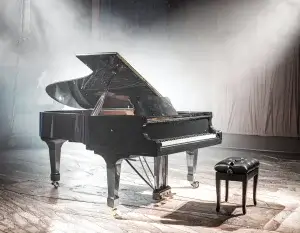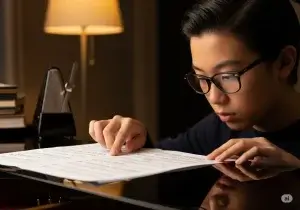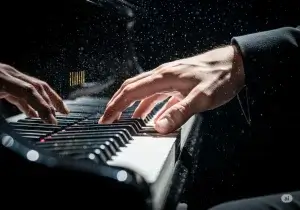When searching for the best piano brands, it quickly becomes clear that several names consistently stand out. These top brands have earned their reputations through decades (even centuries) of quality craftsmanship, innovation, and beautiful sound. Below, we go straight to the point and break down the leading piano makers in the world, what makes each special, and how to choose the right one for your needs. (Audience: Mississauga, Ontario – but the insights apply globally.)
Steinway & Sons – The Iconic Concert Piano Maker
Steinway Model B grand piano
Steinway & Sons is arguably the most famous piano brand in the world, synonymous with concert halls and prestigious music schools. Founded in 1853 in New York by Henry E. Steinway, this company set the standard for what a grand piano should be. A majority of the world’s concert halls own at least one Steinway grand, and Steinway is one of the last surviving American piano manufacturers.
Each Steinway is hand-built with over 12,000 parts. Known for its warm, rich tone and long sustain, the Steinway sound offers a vast dynamic range – from thunderous bass to delicate highs – which is why over 90% of concert pianists choose Steinway for performances. In short, Steinway & Sons remains the gold standard of pianos, offering unparalleled craftsmanship and a legacy of excellence.
Yamaha – Innovation and Reliability at Scale
Yamaha CFX concert grand piano
Yamaha is one of the world’s most recognized piano brands, renowned for its innovation and wide range of instruments. Headquartered in Japan (founded in 1887), Yamaha has grown into one of the largest piano manufacturers by volume, producing around 100,000 pianos each year. Unlike some high-end European brands, Yamaha offers pianos for every level and budget – from affordable upright and digital pianos for beginners, to the flagship CFX concert grand used by professional artists.
Despite their mass production, Yamaha maintains a reputation for reliability and quality control. Their pianos typically have a clear, bright tone (though higher-end Yamaha models also offer warmth and depth). Many music schools and homes in Mississauga (and worldwide) feature Yamaha uprights like the U1/U3 for their combination of quality and value. At the top end, Yamaha’s CF series grand pianos compete on the concert stage. Yamaha’s commitment to innovation is also notable – they produce hybrid pianos and the popular Clavinova digital line. In summary, Yamaha pianos are an excellent choice for those seeking a reliable instrument with modern features, backed by a brand known for craftsmanship and technological advancement.
Kawai – Award-Winning Japanese Craftsmanship
Kawai is another leading Japanese brand that consistently ranks among the world’s best piano makers. Founded in 1927 by Koichi Kawai (a protege of Yamaha’s founder) in Hamamatsu, Japan, Kawai has grown into a global piano company with a presence in almost every major market. Kawai is celebrated for blending traditional craftsmanship with state-of-the-art technology – a formula that has earned the company over 50 major international awards for quality and innovation. In fact, Kawai has been named “Acoustic Piano Line of the Year” multiple times by industry magazines, reflecting its high reputation among music dealers.
Kawai pianos are known for their rich, warm tone and very responsive action. They were pioneers in using modern materials (like ABS-carbon components) in the piano action for durability and consistency. The company produces a full range of instruments from beginner uprights to the handcrafted Shigeru Kawai concert grands (the latter are limited-production instruments comparable to Steinway in performance).
Kawai grands and uprights are found in many conservatories, universities, and concert venues around the world. For buyers in Mississauga, Kawai pianos offer an appealing blend of quality and value – a Kawai upright or grand can deliver a premium sound and feel, often at a lower price than some European counterparts. Overall, Kawai’s dedication to improvement and musicality makes it a top piano brand worthy of consideration.
Bösendorfer – Austria’s Legendary Piano (with Extra Keys)
Bösendorfer is a name that exudes prestige among pianists. Founded in 1828 by Ignaz Bösendorfer in Vienna, this is one of the oldest and most revered piano manufacturers. Bösendorfer grands are handcrafted works of art known for their lush, singing tone and impeccable build quality. One unique hallmark of Bösendorfer is its extended keyboard: certain models, like the 9’6″ Model 290 Imperial, have 97 keys (instead of the standard 88) – providing extra bass notes that enrich the instrument’s tonal range. This extended 8-octave range gives Bösendorfer a uniquely powerful bass and resonance that composers like Liszt and jazz legend Oscar Peterson loved.
Bösendorfer pianos are often described as having a warm, mellow “Viennese” tone, with a deep bass and singing treble. They are also built incredibly solidly – historically, Franz Liszt’s virtuosic playing would break other pianos, but Bösendorfers withstood the challenge. Today, Bösendorfer is owned by Yamaha but continues to craft its pianos in Austria with the same traditional methods. Because of their cost and limited production, finding a Bösendorfer in a private home is rare – these are ultimate luxury pianos. If you do encounter one (for instance, in a Toronto concert hall or a high-end showroom), you’ll experience an instrument many consider second to none in rich tonal color. Bösendorfer truly represents an incredible legacy of European piano building, and it remains one of the best piano brands in the world for those who demand the very finest.
Fazioli – Modern Italian Excellence and Exclusivity
Fazioli is a newcomer compared to the 19th-century giants, but since its founding in 1981 by Paolo Fazioli in Sacile, Italy, it has skyrocketed into the elite ranks of piano brands. Fazioli produces only about 140 pianos per year, focusing on quality over quantity. (For perspective, Fazioli’s annual output is tiny next to Steinway’s ~2,500 and Yamaha’s tens of thousands.)
Each Fazioli grand piano is handcrafted over 2 – 3 years with meticulous attention – using fine Italian red spruce soundboards and even 24k gold-plated parts to prevent corrosion. This obsessive craftsmanship yields instruments with an exceptionally clear, refined tone and superb action. Concert pianists who play Fazioli often remark on the piano’s crystalline clarity, broad dynamic range, and responsive touch. In fact, Fazioli offers the largest regular production concert grand (the F308, at 10’2″ in length) and even builds custom instruments (some with precious inlays or unique finishes) for those who can afford them.
While Fazioli is less known to the general public, it has a passionate following among professionals. Notably, it was the choice of renowned Canadian pianist Angela Hewitt and is featured on many classical recordings for its distinctive sound. Because of its limited production, owning a Fazioli is expensive – they are among the priciest pianos on the market. However, their build quality and performance can justify the cost for serious pianists seeking the ultimate piano. If you ever visit a showroom in the GTA that carries Fazioli, it’s worth playing to hear the difference. In summary, Fazioli has in a few decades secured a place as one of the world’s best piano brands, offering modern Italian craftsmanship at its zenith.
C. Bechstein – German Heritage and a Singing Tone
- Bechstein (often just called Bechstein) is one of Europe’s most storied piano makers. Founded in 1853 in Berlin by Carl Bechstein, this German brand was the choice of composers like Franz Liszt and Claude Debussy in the late 19th/early 20th centuries. Bechstein pianos are admired for their distinct tonal character, often described as a “singing” voice-like sound that is highly lyrical. For over 160 years, Bechstein has focused on precision engineering and exquisite craftsmanship – every part of the piano is made in-house at their German factory, ensuring unified quality.
A Bechstein grand or upright is typically very well balanced across the keyboard, with clear bell-like trebles and a rich middle register. Some pianists characterize the Bechstein tone as slightly darker or more “European” than a Steinway – it can be an “acquired taste” for those who want a specific sound. The brand continues to innovate (they produce modern lines like the Bechstein Academy and Zimmerman for various budgets) while also making replica builds of historical instruments for collectors. Bechstein offers a range of sizes from exquisite uprights to concert grands like the D-282. For pianists seeking German piano tradition and a singing tonal quality, Bechstein remains a top choice. It’s a prestigious brand that combines Old World craftsmanship with a unique tonal palette, easily ranking among the best piano makers in the world.
Blüthner – The Golden Tone of Leipzig
Blüthner is another top German brand, founded in 1853 by Julius Blüthner in Leipzig. Blüthner pianos have been family-owned for six generations and are prized for their warm, golden tone and innovative design. One hallmark innovation is Blüthner’s Aliquot stringing system, which adds a fourth, sympathetic string in the treble section that is not struck by the hammer but vibrates along, enhancing overtone richness. This gives Blüthner pianos a uniquely lush and resonant high register, with “sparkling highs” that project clearly without being harsh. The bass on a Blüthner is typically dark and moody, and the overall sound is often described as romantic and rich.
Historically, Blüthner was favored by great artists like Rachmaninoff, Debussy, and even the Tsar of Russia; Sergei Rachmaninoff was so attached to his Blüthner that he famously said he took only two things to America: “my wife and my precious Blüthner”. Today, Blüthner continues to produce premium grand and upright pianos in Germany, as well as a more affordable line (Blüthner Classic) made with partial production in other countries. They have also branched into extreme luxury with the Blüthner Lucid series (transparent acrylic pianos) in partnership with a custom piano builder – showing a blend of tradition and modernity. For a pianist seeking a high-end piano with a singing, colorful tone, Blüthner is a top-tier brand to consider. Its pianos are truly exquisite instruments that stand among the world’s best.
Mason & Hamlin – America’s Other Legendary Brand
Mason & Hamlin is often mentioned in the same breath as Steinway when discussing great American pianos. Founded in 1854 in Boston, Mason & Hamlin is one of only two surviving American piano manufacturers from the 19th-century golden age (the other being Steinway). In the early 20th century, Mason & Hamlin grands were considered second to none, known for their robust construction and sweet, powerful tone. The company went through hard times later but was revived and still handcrafts pianos in Haverhill, Massachusetts.
Mason & Hamlin pianos are built extremely heavy and durable – they feature a patented Tension Resonator system (a metal brace inside the rim) that helps maintain tuning stability and rich tone over time. The sound of a Mason & Hamlin is typically described as deep and sonorous, with a thunderous bass and clear, singing treble. They are sometimes said to have a darker tone than Steinway. Production is very limited (only around 150 – 200 pianos a year), which means each instrument gets a lot of individual attention.
Mason & Hamlin grands like the Model AA (7’) and Model BB (7’6”) are highly sought by pianists who value the classic American piano sound. In today’s market, Mason & Hamlin finds itself essentially in competition only with Steinway in the U.S., standing as the only two American makers still in business. Owning a Mason & Hamlin is like owning a piece of American music history – and for some, these pianos deliver an unparalleled musical experience with their blend of power and warmth. If you have a chance to try one (they occasionally appear in Canadian showrooms or private collections), you’ll understand why Mason & Hamlin remains a revered name among the best piano brands.
Other Notable Piano Brands to Consider
The piano world is rich with other brands that also deserve mention. While the names above are among the most famous, here are a few other reputable piano brands that piano buyers and enthusiasts in Mississauga (and beyond) might encounter:
- Schimmel – A long-running German maker (since the 1840s) known for quality upright and grand pianos. Schimmel pianos have a clear, bright tone and are aimed at intermediate to professional players. The company produces both a high-end line in Germany and a more affordable “Fridolin Schimmel” line in Asia. Schimmel’s Konzert series grands are very well regarded for their precision and tonal clarity.
- Petrof – A Czech piano manufacturer founded in 1864. Petrof is actually the largest producer of acoustic pianos in Europe today, and their instruments are known for a round, romantic tone. Petrof grands and uprights often have a warm, singing voice. They are popular in homes and schools and offer European quality with a slightly friendlier price than German brands. Petrof’s history and craftsmanship make it a strong contender in the “best piano” conversation, especially in the European market.
- Grotrian-Steinweg – A German piano builder with historical ties to the Steinway family (the company name was once part of Steinway’s early history). Also just called Grotrian, this piano maker’s grands and uprights are high-end, known for a sweet tone and superb build. They aren’t as widely distributed, but are treasured by those who own them.
- Steingraeber & Söhne – A boutique piano maker from Bayreuth, Germany. Steingraeber builds a small number of top-quality pianos each year, incorporating unique innovations (like special action designs for more power). They are often considered among the finest in craftsmanship and sound, on par with the likes of Fazioli in exclusivity.
- Boston & Essex – These are brands designed by Steinway & Sons (USA) but manufactured in Asia (by Kawai and Pearl River factories respectively). They are meant to offer some Steinway design principles at lower price points. If you can’t afford a Steinway, a Boston (mid-range) or Essex (entry-level) piano can be a solid choice for a quality piano with Steinway’s oversight. Many local piano stores carry these, and they are quite popular for serious students.
- Pearl River – Based in China, Pearl River is actually the world’s largest piano manufacturer by volume, producing over 150,000 pianos per year. They build their own brands (Pearl River, Ritmüller, Kayserburg) and also manufacture pianos under contract for other companies (for example, some Essex models, and previously for Yamaha’s entry lines). In terms of quality, Pearl River has made great strides; their higher-end models and their Ritmüller/Kayserburg lines are considered good mid-range instruments. While not yet at the level of Steinway or Yamaha in prestige, Pearl River’s sheer output and improving quality make it a notable name – especially for affordable pianos.
- Digital Piano Brands – If you’re looking for a digital piano (which simulates acoustic pianos electronically), the top brands are slightly different. Yamaha and Kawai are leaders here as well, with their Clavinova and CN/CA series respectively. Additionally, Roland, Casio, Korg, and Nord are highly respected for digital pianos and keyboards. These brands specialize in technology, so if you’re considering a digital piano for home practice with headphones or portability, those names are worth looking into. (Keep in mind, digital pianos can be a great starting point, but they have a different feel and sound compared to the acoustic brands discussed above.)
Each of these brands (and others not listed) has its own strengths. At the end of the day, the “best” piano brand also depends on what you value – be it tone, touch, history, budget, or specific features.
Choosing the Right Piano Brand for You
With so many excellent piano brands available, how do you decide which is the best fit for your needs? Here are a few key points to consider:
- Purpose and Skill Level:
Are you a beginner, an intermediate student, or a professional performer? For beginners or casual players, a reliable and affordable brand (like Yamaha, Kawai, or an entry-level European model) might be ideal. Advanced pianists may require the nuanced tone of a high-end Steinway, Bechstein, Fazioli, etc. Think about whether the piano is for home practice, studio recording, concert performance, or teaching – this will help with choosing a brand/model that makes sense for you.
- Budget Considerations:
Price ranges between brands vary enormously. Top-tier handcrafted instruments (Steinway, Fazioli, Bösendorfer, etc.) can cost well into six figures, whereas a good upright from Yamaha or Kawai might be in the tens of thousands, and quality used pianos or digital pianos can be even less. Determine your budget early. Brands like Yamaha and Kawai offer excellent value for the money in the mid-range. If you have a limited budget, also consider used pianos from good brands – a refurbished Yamaha or older Petrof could be a great deal if in good condition.
- Tone and Touch Preference:
Every brand has a characteristic sound and feel. For example, Steinway pianos are often praised for a warm, rich tone and responsive action; Yamahas are known for a clean, bright tone and a slightly firmer action; European pianos might have a darker or more mellow voice. There is no substitute for trying the piano yourself. If possible, visit local piano dealers or showrooms in the Greater Toronto Area (Mississauga, Toronto, etc.) to play different brands. Your ear and fingers will tell you what feels “right” – some players love the clarity of a Yamaha, while others prefer the warmth of a Blüthner or the powerful bass of a Bösendorfer.
- Size and Space:
The brand you choose might also depend on what size piano you can accommodate. If you live in a condo or small home in Mississauga, a full concert grand (9-foot) is likely unrealistic, regardless of brand. You would instead want to look at uprights or baby grands. Brands like Boston/Essex (Steinway-designed) or Yamaha make excellent uprights that save space. If space is extremely tight or you need volume control, a digital piano from Roland, Yamaha, or Kawai could be the answer, at least as a temporary solution until you can get an acoustic.
- Maintenance and Support:
Popular brands tend to have more technicians familiar with them and readily available parts. In Canada, for instance, finding a qualified Steinway or Yamaha technician is easy. These brands also hold their value well over time. Lesser-known brands can still be great, but ensure that you will have access to tuning and repair services. It’s worth noting that any acoustic piano will need regular tuning (typically 1-2 times a year) and occasional maintenance. All the top brands we’ve discussed build durable instruments, but a well-maintained 30-year-old Yamaha might serve you better than a neglected no-name piano, for example.
In the end, choosing a piano is a very personal decision. The “best” brand is the one that inspires you to play. It’s highly recommended to visit local piano stores (in Mississauga, you might find dealers for Yamaha, Kawai, and sometimes high-end brands via regional distributors) and test multiple pianos. Bring along a piece of music you love and play it on different instruments. You’ll quickly notice how the touch and tone vary. Many experts say the piano chooses you as much as you choose the piano – meaning that when you find the right instrument, you’ll know.
Lastly, don’t hesitate to ask for guidance. Piano teachers (like those at Silver Maple Piano Studio or other local instructors) can offer advice on what brands and models suit a student’s needs. They have seen which pianos hold up well and which ones students enjoy playing. Leverage their experience.
In conclusion, the world’s best piano brands each offer something unique: Steinway offers prestige and powerful sound, Yamaha offers versatility and reliability, Kawai offers award-winning craftsmanship, European makers like Bösendorfer, Bechstein, Blüthner (and others) offer rich traditions and unique tones, and so on. By considering your goals and trying out instruments, you can find a piano that will be a cherished companion for years. No matter which brand you choose, investing in a quality piano is a step toward a rewarding musical journey. Happy piano hunting!







